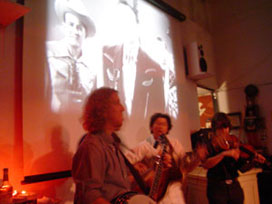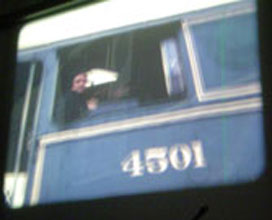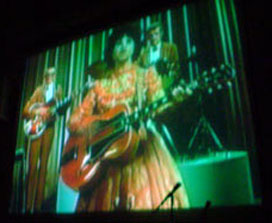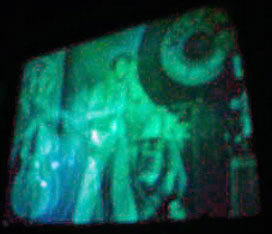Big Country: The Radical Roots of Country Music
25 Sep 2007
An Interview with Jesse Drew
Jesse Drew,[1] filmmaker, digital and new media artist, and media historian, is in production, with Glenda Drew, on a documentary entitled “Big Country,” which seeks to uncover the hidden-in-plain-sight history of country music. Using archival and rare footage, and interviews with veteran performers as well as participants in the current ‘alt-country’ phenomenon, the film asks the question, “Is American Country destined to be homogenized and processed into just another entertainment genre, or will its populist roots ensure its vitality into the generations to come?”
 I caught up with Jesse at Other Cinema as he presented a selection of clips from the work in progress, accompanied by live performances from the Mad Cow String Band[2] from Davis, California.
I caught up with Jesse at Other Cinema as he presented a selection of clips from the work in progress, accompanied by live performances from the Mad Cow String Band[2] from Davis, California.
Peggy Nelson: How did you get interested in Country music?
Jesse Drew: Oddly enough, I’ve never produced anything to do with Country music before. Or even music before, for that matter; but I’ve been a fan of Country music for a long time. It was always just one of those weird things, like “Why do I like Country music?” [laughs], when it has so many connotations of flag-waving, right-wing, yee-haw kind of stuff.
But I always really liked it, so I started to look into it more carefully, and I realized that really, Country music is the only form of music that addresses issues related to the working class. It actually comes out of a very progressive social context. It is essentially the music, and has been the music, of poor people, dispossessed people, hobos, sharecroppers, mountain people. It’s not Republican kind of music. But it has been that recently, so I think it’s an important icon of American music that has been essentially car-jacked.
What this project is about is to take a bigger look at that and trace back the roots of Country music to a more progressive culture. I’m finding it’s pretty easy to do. It’s only been fairly recently that it’s reached this Clear Channel “We hate the Dixie Chicks” kind of phenomenon.
PN: You’re aiming to reclaim it and demystify it?
 JD: Reclaim it and demystify it and remind people of what the roots of this music are. I’ve been studying it and reading a lot, and recently I’ve been doing archival work. I’ve been trying to find clips, old footage that still survives. There’s not a lot of it. One of the difficulties in doing film and archival research for this material is that it was never really taken that seriously. It’s really easy to find more urban music, and high-culture material on film, but Country music was generally a radio phenomenon, so while there are recordings of it, it was generally never taken seriously as a filmic phenomenon.
JD: Reclaim it and demystify it and remind people of what the roots of this music are. I’ve been studying it and reading a lot, and recently I’ve been doing archival work. I’ve been trying to find clips, old footage that still survives. There’s not a lot of it. One of the difficulties in doing film and archival research for this material is that it was never really taken that seriously. It’s really easy to find more urban music, and high-culture material on film, but Country music was generally a radio phenomenon, so while there are recordings of it, it was generally never taken seriously as a filmic phenomenon.
PN: Is there a connection between what we categorize as ‘Folk’ music and Country music?
JD: Oh definitely, and I think that’s really an interesting thing. Hank Williams called himself a *Folk musician. The word ‘Country’ doesn’t even enter into the lexicon until the 1950’s, it was *all considered Folk music. Woodie Guthrie is really not that different from Hank Williams in a lot of respects, they all had radio shows and they all had these funny personae; there was a lot of humor.
It’s not until McCarthyism, not until Pete Seeger gets dragged into the House Un-American Activities Committee, that all the folk music you see gets tarnished as being ‘Communist.’ Then suddenly in the music and trade press you see people referring to ‘Country’ music, and ‘Western’ music. In other words, they’re saying “We’re not Folk, we’re not Folk, we are ...*this [other thing].” I think that’s really an interesting phenomenon. Even today it’s very hard to characterize. I mean, it’s kind of amusing, you go into a record store and you see what they stick in ‘Folk’ and what they stick in ‘Country,’ and you wonder, “Well, why is this Country and not Folk?”
PN: What about things like the soundtrack for ‘O Brother Where Art Thou?’ and the recent enthusiasm for Bluegrass?
 JD: Actually, Bluegrass is about 50 years old.
JD: Actually, Bluegrass is about 50 years old.
PN: So it’s new?
JD: Bluegrass is new. Ironically.
PN: Doesn’t it have roots in Celtic music?
JD: Well, there’s ‘old-time’ music, by which most people mean those traditional Celtic and Scottish jigs and reels and all that kind of stuff. Bluegrass is actually a newer form of music that was, you could say invented, in the 1950’s by Bill Monroe, Lester Flat and Earl Scruggs. That’s when the first use of the term Bluegrass comes in.
PN: How would those musicians characterize themselves, or how would you characterize them?
JD: It’s more picking, the banjo has a more central role. To me it’s a fine point, I never would have gotten it unless I hadn’t started to do this and figure this out. Even in the 1950s, Bluegrass is an effort on the part of those traditional musicians to get back to those roots. That strain comes up into the present day with a lot of people who want to get involved in what they call ‘Alt-Country.’ There’s a lot of overlap between Alt-Country and Bluegrass enthusiasts. That’s really different from the Nashville mainstream country of Shania Twain and Faith Hill.
PN: Which seems very ‘produced,’ to me.
JD: Yeah, really, they want to be Pop. It’s very much geared to get as mainstream an audience as possible. The whole Garth Brooks thing: put a cowboy hat on him, and it would basically be the same.
But what I’m investigating is something different. For example, I have a clip of a Bill McClintock song. One of the interesting things about him is that he was a member of the Industrial Workers of the World (IWW, or ‘Wobblies’). So what I did in the clip is recut to footage of Wobblies to contextualize what he was singing about. He was really singing about a utopia, in the face of working class oppression, to a large degree. And I have a scene of Bill Monroe singing in Hazard, Kentucky in 1952, which was when Bluegrass was totally new.
There is a big interest in Alt-Country today, there are a lot of newbies involved with it, and I think it will be interesting for them to know what roots of this material, and why it rings a chord with so many people today. Politically, for example: if you listen to Uncle Tupelo and Wilco, they went back and rediscovered a lot of Appalachian political-type music.
PN: Stuff that wasn’t just about, “oh, my wife left me,” or whatever.
JD: Right. For example, the whole Billy Bragg phenomenon; and Steve Earle is also right in that vein.
PN: Where does Johnny Cash fit into this history?
 JD: I think Johnny Cash is an interesting person because he blurs all those boundaries. He’s one of the main people I’ve listened to all my life, and he does invoke all of that symbolism. I mean, I’ve seen him when I was a kid, and it was flags waving, and all this supposed super-patriotic stuff, but all his songs are about poor people, people in prison, American Indians; you know, people that have gotten screwed over. So I think he’s a perfect icon of rebellious music, and that’s very hard to pin down. He’s emblematic of Country Music but within that it is very ambiguous. On the one hand, you’ll have a song that’s about God and country, and going to church, but the next one is about rambling and gambling and getting drunk and fighting, and they are presented as if there’s no contradiction there at all. Johnny Cash is kind of like that too personally, in that he’s a super-patriot on the one hand, and on the other he’s condemning our set of social institutions, and making fun of prison authorities and drug laws.
JD: I think Johnny Cash is an interesting person because he blurs all those boundaries. He’s one of the main people I’ve listened to all my life, and he does invoke all of that symbolism. I mean, I’ve seen him when I was a kid, and it was flags waving, and all this supposed super-patriotic stuff, but all his songs are about poor people, people in prison, American Indians; you know, people that have gotten screwed over. So I think he’s a perfect icon of rebellious music, and that’s very hard to pin down. He’s emblematic of Country Music but within that it is very ambiguous. On the one hand, you’ll have a song that’s about God and country, and going to church, but the next one is about rambling and gambling and getting drunk and fighting, and they are presented as if there’s no contradiction there at all. Johnny Cash is kind of like that too personally, in that he’s a super-patriot on the one hand, and on the other he’s condemning our set of social institutions, and making fun of prison authorities and drug laws.
I have a really funny clip of him where you can get a glimpse of his complexity. He’s imitating Elvis Presley, and it’s hilarious, it’s unbelievable.
PN: And where does somebody like Elvis fit in?
JD: In the 1950s, as this music was developing, you had a choice in terms of where you wanted to go. Do you want to go into Country, which was really on the decline at that point, or did you want to go towards Rock ‘n Roll, which was the hip happening thing? That’s where Rockabilly comes out of, that crossroads. Johnny Cash was originally very close to Roy Orbison and Buddy Holly.
PN: You said it was hard to find this footage. What are some of the sources that you went to for it?
JD: There’s a distributor in Germany called Bear Records, I got some stuff from them. I got stuff off eBay. There’s material that’s stuck on tapes and is just mouldering around and who would want this? Normally even I wouldn’t want it, but I was looking for a particular set of songs and performers. For example, Loretta Lynn singing ‘The Pill,’ which is a really interesting phenomenon, particularly in light of what’s happening today, in terms of the whole attempt to roll back abortion rights. It’s about *The Pill, and how happy she is that she’s on the pill! I mean, you can’t get more of a Country icon than Loretta Lynn, and I don’t think she could get away with that song today, which is ironic.
One of the things I want to challenge in this film is the notion that Southerners and rural people are inherently conservative. That’s really my motivation for this film. It’s not about the stars. It’s not even really about the music industry, it’s about looking at the tradition of Southern and rural activism, seen through the music. It’s a hoax, perpetrated on a lot of people, that all that rabble-rousing stuff is only urban stuff, and that it’s also mostly people of color. I think there’s been a deliberate effort to cut off white working class radical traditions, and I think that it’s pretty much dead.
PN: If they don’t know their history ...
JD: They don’t know their history, and that’s why I have stuff in here about the struggles of the mine workers, textile workers’ strikes in the 1930s, and farm workers’ strikes in California amongst Okies and white people. People think that sharecroppers are only Mexicans, but it wasn’t that long ago that they were mostly white, and they were radical, a lot of them; there were strikes in the fields of California by Okies. That’s the other main pillar of what I’m trying to do.
PN: What have been some of your previous projects?
JD: I’ve shown stuff here (at Other Cinema); a lot of it has been more experimental stuff. I think my general theme has been a revisionist look at things. I did a short piece called ‘Manifestoon,’ which was a Disney collage cut to the Communist Manifesto. I did a documentary on East Germany. I’ve been a member of the Paper Tiger TV Collective for 20 years, so I’ve done a lot of media stuff. I’ve been really involved in projects and activities that have led up to things like the IndyMedia Center.
I’ve worked on other people’s projects too, and I do art; that’s why I’m up at [The University of California at] Davis, because I do a lot of digital, new media, and interactive work. I have a background in union organizing, and I also have a background in the electronics industry.
PN: What’s your union organizing background?
JD: I was in the Glass-Blowers Association. I worked in big glass factories, big glass bottle factories, so I was a union activist then. I was also in the Teamsters union, this was all in the 1970s. I was active in Teamsters for a Democratic Union. I was involved in the United Electrical Workers Union (UE), trying to organize Silicon Valley, in the early 1980s.
PN: They published that great book, “Labor’s Untold Story.”
JD: The UE was one of the 13 unions banned from the AFL-CIO during McCarthyism. Then the AFL-CIO started the IUE, which was essentially a dummy union, that was set up to raid the UE. There’s also the IBEW, which is more trade-based. When I was involved, I was in the plant, I wasn’t a hired outside organizer. I was working in the industry.
So I have a strong background in the labor movement. I think that’s also why I’m really interested in Country music, because within those crafts, a lot of people listen to that kind of music.
One of the points I want to raise is that Country music used to be more of a critique of work. Currently it’s just about doing your job, because a real man just does his job, gets the job done, and that’s the attitude. But one of the strongest traditions in country music for decades was the hobo tradition, which is essentially, take this job and shove it! That song, “Take This Job and Shove It!” made famous by Johnny Paycheck (and written by David Allen Coe), was once *the *anthem for auto workers. My wife at the time was a shop steward in the UAW, so I knew a lot of auto workers then. You don’t hear that kind of attitude as much anymore.
Currently, in between all our other projects we’re working on, we are interviewing scholars of Country music, shooting bands that come our way, and trying to set up interviews with some of the major performers we’re interested in. We hope to have some kind of rough cut by the end of next year, and we would love to lob this Country grenade deep into Red State territory soon thereafter.
◊